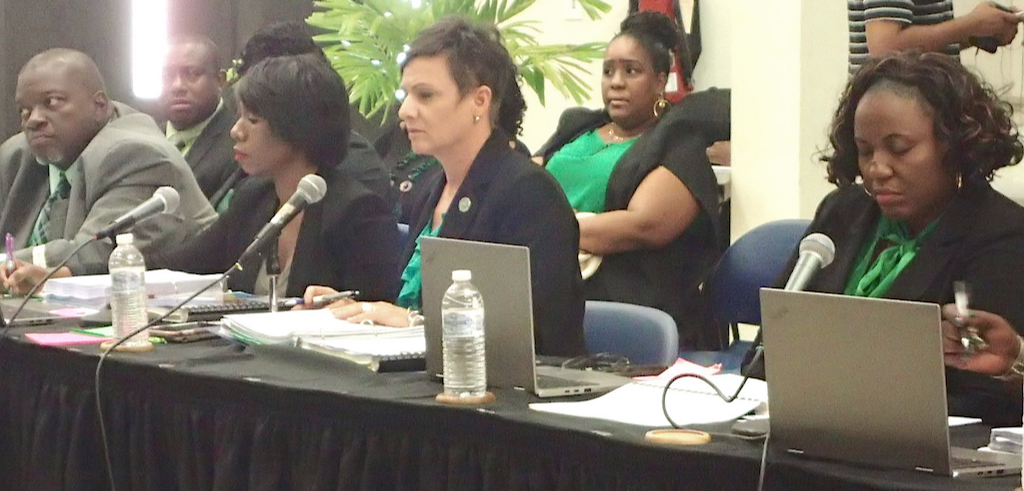
One of the most significant threats to the Department of Human Services and residents of the territory is the Medicaid “fiscal cliff” on Oct. 1, when the federal act expires that provided for 100 percent match for Medicaid funding.
Through the Affordable Care Act and the Bipartisan Budget Act of 2018, Congress gave the territory access to additional funding because it determined the Virgin Islands is medically underserved and 22 percent of the residents live below the poverty line. With the additional funding, which expires Sept. 30, Medicaid serves more than 29,000 clients – more that a quarter of the population.
“If Congress does not enact legislation to increase the amount of Medicaid funding and increase the FMAP (Federal Medical Assistance Percentage), the implications to the territory would be devastating,” Human Services Commissioner Kimberly Causey-Gomez, told the Senate Finance Committee during a hearing at the University of the Virgin Islands Friday.
With the return to a match rate of 55 percent for federal and 45 percent for local funding, the Medicaid subsidy would be capped at $18.7 million, according to the commissioner.
Under direct questioning, Causey-Gomez said 15,000 people would lose coverage. She told the lawmakers the department would work to retain seniors and children under Medicaid.
In June, government officials traveled to Washington D.C. and Gov. Albert Bryan has testified on three or four occasions about the importance of the funding.
During Friday’s hearing, Sen. Janelle Sarauw talked about the meetings in Washington to plead for state-like treatment under the Affordable Care Act. Sen. Kurt Vialet, Finance committee chair, expressed doubt since Congress is due to recess Aug. 1 and nothing has been done up to now.
Senators seemed satisfied with the state of elderly services, the Herbert Grigg Home for the Elderly, hurricane shelters and relationships with non-profit organizations.
A discussion on staff shortages at Head Start led to Vialet grilling staff about the government procurement process and forms being returned to Human Services for more information, especially from the Office of Management and Budget. Sen. Kenneth Gittens also expressed disapproval at the number of job vacancies given the number of people looking for employment.
“Somehow I’m not seeing that sense of urgency and you need that sense of urgency. And we are seven months in so and I’ve told others, we cannot refer back to the past administration,” Vialet said.
Overall, Health has 188 vacant positions which “directly impacts the delivery of services,” according to Causey-Gomez. Nurses, social workers and other critical positions comprise 132 of the vacancies.
Also affecting staff is damage to the department’s buildings due to 2017 hurricanes, lack of office space, financial considerations and stress from fewer staff to do more work, she said.
The Department of Human Services has 677 active employees in 12 divisions, serving 84 programs; 24 part timers serve the Senior Community Services Employment Program. Human Services serves low income individuals and families, persons with disabilities, people in need of supervision and the elderly. The department also supplies and mans hurricane shelters.
The department’s 2020 budget of $172.3 million includes $100.9 million in Federal funding, $69.2 million from the General Fund and $2.1 million of non-appropriated funds.
The General Fund budget comprises $21.2 million for personnel, $9.8 million in fringe benefits, $1.5 million for supplies, $35.2 million for other services and utilities estimated at $1.5 million.
The largest expenditures from the General Fund will be: almost $27 million for required local matches for federal grants; $14.1 million for the Medical Assistance Program; $13.3 million for residential services; $10.3 million for the commissioner’s office; almost $10 million for Senior Citizens Affairs; and, $7.9 million for the Family Assistance Program.
More than half of federal funding will be used for the Supplemental Nutrition Assistance Program, commonly called Food Stamps, and more than $50 million for MAP and $8.3 million for Head Start.
Senator’s present during the hearing were: Sen. Novelle Frances, President of the Senate, Marvin Blyden, Kenneth Gittens, Donna Frett-Gregory, Oakland Benta, Dwayne DeGraff, Sarauw,Vialet, and Alicia Barnes.





